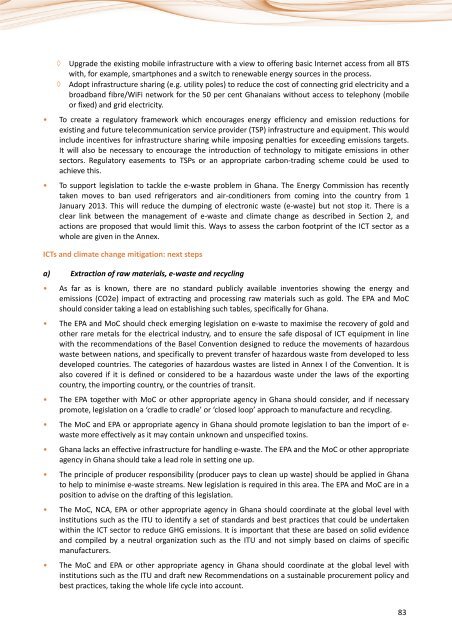Information and communication technologies (ICTs) and ... - ITU
Information and communication technologies (ICTs) and ... - ITU
Information and communication technologies (ICTs) and ... - ITU
Create successful ePaper yourself
Turn your PDF publications into a flip-book with our unique Google optimized e-Paper software.
Upgrade the existing mobile infrastructure with a view to offering basic Internet access from all BTS<br />
with, for example, smartphones <strong>and</strong> a switch to renewable energy sources in the process.<br />
Adopt infrastructure sharing (e.g. utility poles) to reduce the cost of connecting grid electricity <strong>and</strong> a<br />
broadb<strong>and</strong> fibre/WiFi network for the 50 per cent Ghanaians without access to telephony (mobile<br />
or fixed) <strong>and</strong> grid electricity.<br />
• To create a regulatory framework which encourages energy efficiency <strong>and</strong> emission reductions for<br />
existing <strong>and</strong> future tele<strong>communication</strong> service provider (TSP) infrastructure <strong>and</strong> equipment. This would<br />
include incentives for infrastructure sharing while imposing penalties for exceeding emissions targets.<br />
It will also be necessary to encourage the introduction of technology to mitigate emissions in other<br />
sectors. Regulatory easements to TSPs or an appropriate carbon-trading scheme could be used to<br />
achieve this.<br />
• To support legislation to tackle the e-waste problem in Ghana. The Energy Commission has recently<br />
taken moves to ban used refrigerators <strong>and</strong> air-conditioners from coming into the country from 1<br />
January 2013. This will reduce the dumping of electronic waste (e-waste) but not stop it. There is a<br />
clear link between the management of e-waste <strong>and</strong> climate change as described in Section 2, <strong>and</strong><br />
actions are proposed that would limit this. Ways to assess the carbon footprint of the ICT sector as a<br />
whole are given in the Annex.<br />
<strong>ICTs</strong> <strong>and</strong> climate change mitigation: next steps<br />
a) Extraction of raw materials, e-waste <strong>and</strong> recycling<br />
• As far as is known, there are no st<strong>and</strong>ard publicly available inventories showing the energy <strong>and</strong><br />
emissions (CO2e) impact of extracting <strong>and</strong> processing raw materials such as gold. The EPA <strong>and</strong> MoC<br />
should consider taking a lead on establishing such tables, specifically for Ghana.<br />
• The EPA <strong>and</strong> MoC should check emerging legislation on e-waste to maximise the recovery of gold <strong>and</strong><br />
other rare metals for the electrical industry, <strong>and</strong> to ensure the safe disposal of ICT equipment in line<br />
with the recommendations of the Basel Convention designed to reduce the movements of hazardous<br />
waste between nations, <strong>and</strong> specifically to prevent transfer of hazardous waste from developed to less<br />
developed countries. The categories of hazardous wastes are listed in Annex I of the Convention. It is<br />
also covered if it is defined or considered to be a hazardous waste under the laws of the exporting<br />
country, the importing country, or the countries of transit.<br />
• The EPA together with MoC or other appropriate agency in Ghana should consider, <strong>and</strong> if necessary<br />
promote, legislation on a ‘cradle to cradle’ or ‘closed loop’ approach to manufacture <strong>and</strong> recycling.<br />
• The MoC <strong>and</strong> EPA or appropriate agency in Ghana should promote legislation to ban the import of e-<br />
waste more effectively as it may contain unknown <strong>and</strong> unspecified toxins.<br />
• Ghana lacks an effective infrastructure for h<strong>and</strong>ling e-waste. The EPA <strong>and</strong> the MoC or other appropriate<br />
agency in Ghana should take a lead role in setting one up.<br />
• The principle of producer responsibility (producer pays to clean up waste) should be applied in Ghana<br />
to help to minimise e-waste streams. New legislation is required in this area. The EPA <strong>and</strong> MoC are in a<br />
position to advise on the drafting of this legislation.<br />
• The MoC, NCA, EPA or other appropriate agency in Ghana should coordinate at the global level with<br />
institutions such as the <strong>ITU</strong> to identify a set of st<strong>and</strong>ards <strong>and</strong> best practices that could be undertaken<br />
within the ICT sector to reduce GHG emissions. It is important that these are based on solid evidence<br />
<strong>and</strong> compiled by a neutral organization such as the <strong>ITU</strong> <strong>and</strong> not simply based on claims of specific<br />
manufacturers.<br />
• The MoC <strong>and</strong> EPA or other appropriate agency in Ghana should coordinate at the global level with<br />
institutions such as the <strong>ITU</strong> <strong>and</strong> draft new Recommendations on a sustainable procurement policy <strong>and</strong><br />
best practices, taking the whole life cycle into account.<br />
83

















